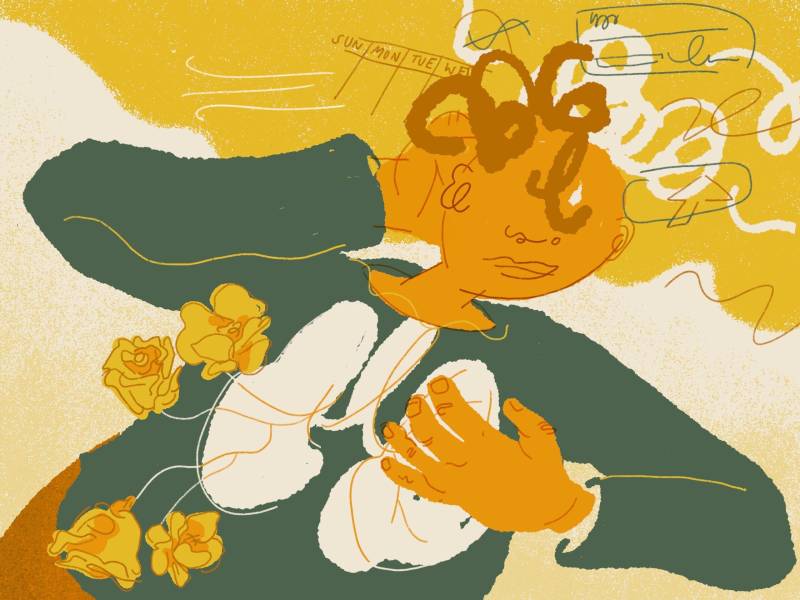This guide is part of the KQED News series What to Do After a Layoff.
Getting laid off can have many immediate consequences — losing your source of income, having to cut back on spending and dipping into your savings — but it can also have emotional repercussions.
A job can represent security and stability, and when that is taken away, our mental health also takes a hit. So, looking after our mental health is equally critical as figuring out how to keep paying the bills. If we don’t respond to our mental health needs after losing a job, that can hamper our ability to problem-solve, says Redondo Beach-based Kelli McLean, a marriage and family therapist who works on issues relating to trauma, anxiety and depression with her clients all over California.
“Once one crisis happens, it’s more likely for additional crises to happen,” she said. “Mental health is like a snowball.”
Since the start of the pandemic, researchers have been learning more about the relationship between layoffs and mental health. A 2021 study by Irish and American researchers sampled 2,301 adults in the United States who had a job before the start of COVID-19. Those who were laid off reported higher symptoms of depression, anxiety and stress than those who kept their jobs.
Jump straight to:
- How can I tell my family I’ve been laid off?
- How can I truly make time for self-care after a job loss?
- How can I access mental health care after losing my employer-based health insurance?
“You lose your job, and then what happens is stress,” said McClean, who noted that once stressors increase, that “snowball” effect can lead to possible outcomes like tension with a partner, a breakup or overreliance on substances like alcohol. Because “these things tend to happen, one after another,” McLean said, “it’s really important for us to be proactive when we’re in a crisis, as opposed to pulling the covers over our head.”
KQED spoke to several mental health professionals across California, including McLean, to hear their thoughts on how you can deal with the emotional fallout of losing a job, the best ways to reassure and support those who depend on you and how to protect your mental health as you prepare for your next move.
Every situation is different, but here are some bigger insights that could be of use during difficult times.
When you first get the bad news
Why do many of us feel so bad when we lose our jobs? Of course, part of it comes from the very real challenge of losing our source of income and not knowing how we will pay our bills.
But over time, our jobs can become part of our identity. When we lose our jobs, that part of who we are is taken away. “Your work persona, your work identity — it comes to you over time, but it doesn’t define you,” said Ioanna Angelakis, a marriage and family therapist based in San Francisco. She helps patients navigate career decisions and the anxieties that may be tied to them.
“I come from a perspective that we all have infinite capacities and we have so many strengths that are left untapped,” Angelakis said. “Look at your dreams and define who you want to become, and who you always dreamed you would become.”
- Read more layoff advice in our What to Do After a Layoff series
Then, Angelakis recommends, “take the time to contrast that with your recent role. See if there is a mismatch — and whether you can pick up where you left off.”
It’s also important to remember that you are not alone in this experience, adds McLean. “This happens to most people at some point in their career. Most of the time it’s not your fault.”
“It’s simply random,” she went on. “It’s simply because of budget cuts or because the company is downsizing.” Read more about how to make a layoff feel less personal.
Both McLean and Angelakis stress to be kind to yourself after you get the bad news. This is just the first step in a longer journey, and granting yourself patience will help you face the coming challenges.

How do you tell loved ones you’ve been laid off?
Figuring out how we want to share the bad news with those we care about can be another source of anxiety. These people can include our friends, partners or spouses, children and parents.
“We begin to feel like we failed — that we failed them, or that we were not able to fulfill our goals,” said Angelakis. But you should let yourself release those thoughts, she advises, and remind yourself that a layoff does not define your potential — as a professional, or as a person overall.
When you raise the news with your spouse or partner, share what you’re feeling and be clear about what type of help you need from them, Angelakis said: “You can remind them … to be your ally.”
And if you have both a partner and children, make a plan with your partner first on how you want to tell your kids — depending on how old they are and what you know of their emotional capacity for topics like this. But most importantly, she stressed, “Be age-appropriate.”
“If you’re talking to your 6-year-old child, you don’t want to say, ‘Mom got fired,’ or ‘Mom got canned.’ You might want to say something like, ‘Mom’s not going to the office for a little while,’” she said.
“I think a lot of people go into this talking to their kids like they’re little adults,” McLean said. Although that might be your impulse, it “can be really scary for a child if they’re being talked to like they’re a little adult,” she said. “Kids tend to worry about this kind of thing if it’s not handled age-appropriately.”
For younger kids more capable of handling upsetting news, as a parent or caregiver you might consider keeping it simple — that you don’t have that job anymore and are looking for an even better one, perhaps — and assure them there’s nothing to worry about.
You can also be honest with kids about how you feel, McLean says — but make sure to be clear about whether some things at home will change moving forward, even temporarily. “If you’re cutting down on some extracurricular activities, make sure that you’re still doing things with the kids where they’re getting quality time with you, maybe if it’s just going to the library, or going to the park,” she said.
And make sure to keep checking in with your kids consistently while you’re looking for your next job. Children “tend to have tummy aches, or they tend to say, ‘I’m not feeling good’” when they’re worried about something, McLean said. “If you’re comfortable with their teachers, maybe let their teachers know, and keep to your family structure as much as possible.”


